FCC's Copps fears 'cable-ization of the Internet'
The professional video industry's #1 source for news, trends and product and tech information. Sign up below.
You are now subscribed
Your newsletter sign-up was successful

Michael Copps, the senior Democrat FCC commissioner who has long opposed the increased consolidation of broadcasting ownership, was dead against the Comcast-NBCU deal from the beginning. He warned that it is “a transaction like no other that has come before this commission — ever.
“It reaches into virtually every corner of our media and digital landscapes and will affect every citizen in the land,” he said in a dissent after casting the lone vote against the deal. “It is new media as well as old; it is news and information as well as sports and entertainment; it is distribution as well as content; and it confers too much power in one company’s hands.”
Copps argued that with all the conditions attached to the deal, one “cannot mask the truth that this Comcast-NBCU joint venture grievously fails the public interest.” In fact, he said, the conditions “that have been added aim no higher than maintaining the status quo.”
The approval of this transaction was from its initial announcement “the steepest of climbs for me, given my long-standing opposition to the outrageous media consolidation this country has experienced over the past few decades,” Copps said. However, the veteran FCC commissioner said he tried to understand the points of view of those involved.
“At the end of the day, the public interest requires more, much more, than it is receiving,” Copps continued. “The Comcast-NBCU joint venture opens the door to the cable-ization of the open Internet. The potential for walled gardens, toll booths, content prioritization, access fees to reach end users and a stake in the heart of independent content production is now very real.”
As for the future of America’s news and journalism, Copps said he saw nothing in this deal to address the fundamental damage “that has been inflicted by years of outrageous consolidation and newsroom cuts. Investigative journalism is not even a shell of its former self. All of this means it’s more difficult for citizens to hold the powerful accountable.”
“It means thousands of stories go unwritten. It means we never hear about untold instances of business corruption, political graft and other chicanery; it also means we don’t hear enough about all the good things taking place in our country every day,” he said.
The professional video industry's #1 source for news, trends and product and tech information. Sign up below.
“The slight tip of the hat that the applicants have made toward some very limited support of local media projects does not even begin to address the core of the problem,” he continued. “Given that this merger will make the joint venture a steward of the public’s airwaves as a broadcast licensee, I asked for a major commitment of its resources to beef up the news operation at NBC. That request was not taken seriously.”
Copps said the merger erodes diversity, localism and competition, the three essential pillars of the public interest standard mandated by law.
“I would be true to neither the statute nor to everything I have fought for here at the commission over the past decade if I did not dissent from what I consider to be a damaging and potentially dangerous deal,” Copps said.
